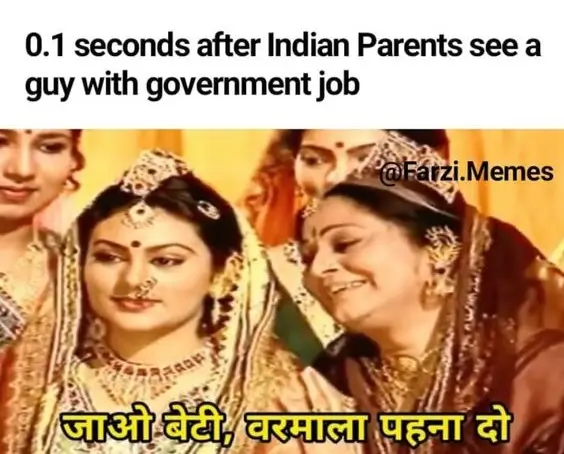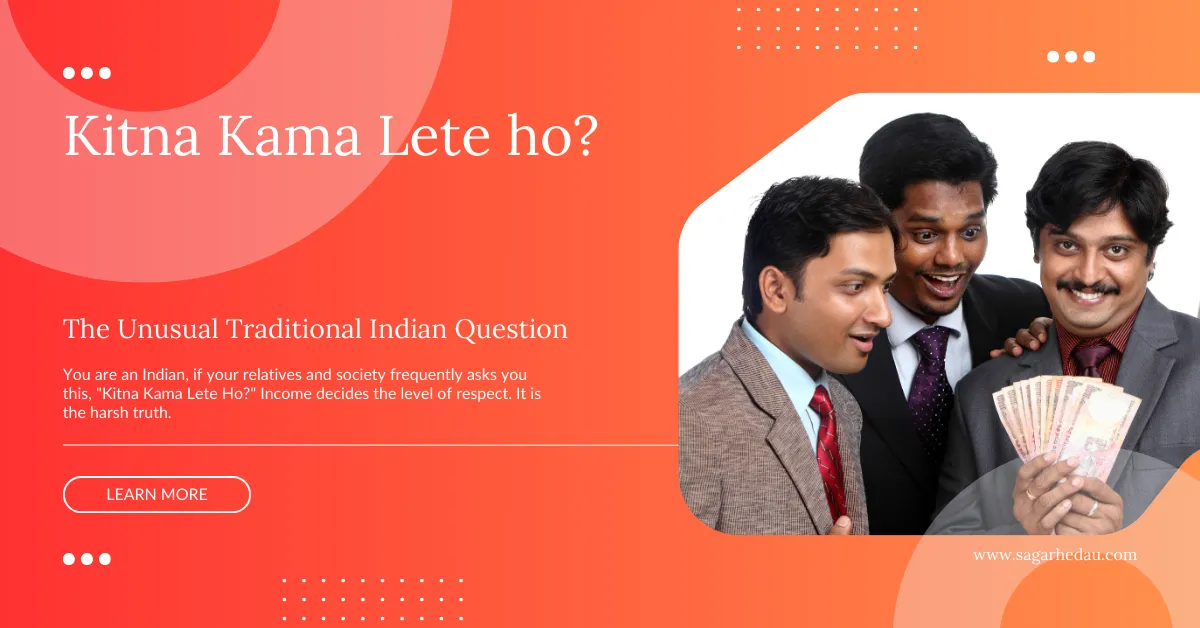We are Indians. Every man always gets this question, “Kitna Kama Lete Ho?“. At least the male audience does. We know the middle, poor, business, and elite classes. Sab Sahi Hai. From the outside and our point of view, we can see that they have everything they need, but we don’t.
This analysis of our peer network and social connections creates a make-believe scenario in our mind and then we start THE COMPARISON.
This comparison then leads to an analysis of the stats which don’t even exist. We start judging them according to their lifestyle. Their travelling frequency and the destinations as well. Then what we discuss is, “Bohot paisa hai yaar inke paas“.
This ridiculous and self-sabotaging thought process is what makes us a failed society. A percentage of it at least. Judging our own life and situation based on how others are living is the most ridiculous thing to do today or any day.
What else is happening in society, among the millennials, the GenZ and also our parental generation? To everyone’s surprise, they are also discovering business opportunities and home-based business ideas based on the recent trend of Layoffs.
Let’s see, what else we have to discuss related to, “Kitna kama lete ho?”
Before Covid-19, it was like, “Ye to hota rehta hai. Koi company hamesha profit me nahi rehti.”. Now the discussion turns around like, “Ye kisike sagey nahi hai. Paisa bachane ke liye employee ko hi hatana padega naa. Kaaran: Loss/Budget.”
Translation for English audience [When this article starts ranking]:
“This is going to happen. No company always remains in profit.” Now the discussion turns around like, “You are not their family. To save money they will have to fire employees only. Reason: Loss/Budget.”
So coming to the main question, “Kitna Kama Lete Ho?”. This question is applicable for:
- Every groom that is ready or thinking he is ready to get married.
- Every tenant who is trying to get a flat on rent.
- Every guy in the family who has just started a job.
- Every man who is trying to achieve something and dreaming big.
- Every man working the core/applied sector: By his relatives, crush, and society.
- Every bank when he needs a loan.
Current Scenario of Kitna Kama Lete Ho?
How much does a corporate employee, a government servant, an entrepreneur, or a freelancer earn? Considering they all have mid-level[4-6 yrs] experience in their respective field.
- SBI PO: ₹6.7-7.8 Lakhs/annum.
- LIC AAO: ₹9-11 Lakhs/annum.
- Chartered Accountant: ₹10- 17 Lakhs/annum.
- Private Bank Salary: ₹13.8 Lakhs/annum.
- Mechanical Engineer Salary: ₹5-6 Lakhs/annum.
- Electrical Engineer Salary: ₹5.5-9 Lakhs/annum.
- Civil engineer Salary: ₹5.8-8.5 Lakhs/annum.
- Software Developer Salary: ₹12–14 Lakhs/annum.
- Digital Marketer Salary: ₹10 Lakhs/annum.
- Data Scientist Salary: ₹8–10 Lakhs/annum.
- Content Writer Salary: ₹8.4-12 Lakhs/annum.
So, even if the Government Job salary looks lower as compared to the IT professionals, it will be still the most preferred job, why? JOB SECURITY = PERMANENT JOB. But, the recruitment competition is extremely tough and going to prove very tantalizing.
So, we understand that every candidate is not going to get placed in SBI or LIC or a government entity for that matter. Also, PSUs like SAIL, GAIL, NTPC, and BHEL rely on the GATE exam score for engineering job opportunities.
I as a candidate never got any of these opportunities for the following reasons:
- I did not get an AC result every semester.
- I did not score 60%+ in every semester.
- My engineering spanned 6 years.
- My score in 12th was under 60%.
So, coming back to kitna kama lete ho? Why is this question so hyped? Why are people interested in knowing how much you earn? What are the reasons which make people ask this to anyone? Let’s see.
Scenario 1: Shaadi Ki Baat
Please do not take this personally. This is what the scenario is in India.
I am the elder son in my family. My marriage talks are in progress. Questions from Ladkiwale:
- Haan beta! Kaha kaam karto ho?
- Kitna kama lete ho? Package/CTC kitna hai?
- Pune me ho ya Bengaluru me?
These questions are just the start. Next is:
- Family ka saath rehte ho ya akele?
- Hamari Beti job nahi karti.
- Shaadi ke baad dekhenge.
- M.Tech/M.B.A. ho gaya hai uska.
Now, every answer is presented, and you go ahead. “AAL IZZ WELL”. This is a typical scenario for a boy who is about to get married. In every scenario, kitna kama lete ho is constant.
Scenario 2: Degree ho gai. Ab kya?

As a career counsellor and an IT educator, I see multiple candidates enrolling in our job-oriented courses. Some are freshers, some are switching profiles and then some just appeared for government exams for 3 years, 4 years and more but didn’t crack it. Now what? “Sir, job chahiye, course karna hai. Guaranteed placement hai?” I mean REALLY???
You don’t have skills, you have literally wasted 4-5 years on a single dream which never materialized. You didn’t develop any skills on a parallel basis. 5 years later immediate freshers are going to be your competitors. How are you supposed to get the preference? Are you seriously kidding yourself?
Companies opt for immediate freshers so that they can groom into better leaders with them. So, a 26-28 year old is not going to fit in. They need a 22-23 year old who can be a senior at 26-27 and take up the team handling.
Also, priorities for a 28-year-old are a lot different for financial expectations and personal life [sidhe sidhe bolo to shaadi ki baatein]. Then the bridal family comes asking, “Kitna kama lete ho?”.
A degree is just a qualification which gives you a certain edge in cases like profile-specific jobs. For example, a mechanical engineer is the only answer for a production engineer job or a mechanical maintenance job. An electrical engineer is the only answer for electrical maintenance. You cannot put an IT or a commerce guy there.
So, more than a degree, skills matter a hell lot today. If we talk about hiring in Google.
While a degree is often recommended for getting hired at Google, it’s not necessarily a strict requirement for all positions. Here’s a breakdown:
- Generally: Google emphasizes skills and experience over traditional qualifications. If you have the necessary skills and can demonstrate your abilities through projects, certifications, or a strong portfolio, you might be considered for a role even without a degree.
- Focus on Skills: Google looks for candidates with strong technical skills relevant to the specific job role. This could include programming languages, data analysis skills, software development expertise, etc. Additionally, soft skills like communication, problem-solving, and teamwork are highly valued.
- Experience Advantage: Relevant work experience, internships, or freelance projects can significantly strengthen your candidacy, showcasing your practical application of skills.
- Some Roles Might Require Degrees: For certain positions, particularly senior or leadership roles, a degree in a relevant field (e.g., Computer Science, Engineering) might be a prerequisite.

FOCUS ON SKILLS. Skills like programming, data science, digital marketing, content writing, graphics designing, mobile app development, and project management are your saviour. Build a relevant skillset in these and take up the IT career. You won’t be asked about your qualifications here.
I am a Mechanical engineer and I am working as a Digital Marketing Strategist/Career Counsellor. No connection whatsoever. So, degree ka mat socho unless you are 100% planning a government job.
Even there, banking and other sectors only require graduates, no specific degree.
If you need to discuss anything related to your career plan, I can help.
Scenario 3: Government Job & Campus Recruitment
First of all, no government agency is coming for campus recruitment unless you are in IIT or NIT. Their recruitment criteria are very specific. If we take about engineering fields, the GATE exam is necessary, throughout AC with 65% minimum marks. A degree is a must.
Check the list of the top Navratna companies:
| S.No. | Company Name | Established Year |
|---|---|---|
| 1. | Engineers India Limited (EIL) | 1965 |
| 2. | Container Corporation of India Limited (CONCOR) | 1988 |
| 3. | Bharat Electronics Limited (BEL) | 1954 |
| 4. | Hindustan Aeronautics Limited (HAL) | 1940 |
| 5. | Neyveli Lignite Corporation Limited (NLC India) | 1956 |
| 6. | Rashtriya Ispat Nigam Limited (RINL) | 1971 |
| 7. | Rashtriya Chemicals & Fertilisers Limited (RCF) | 1978 |
| 8. | Mahanagar Telephone Nigam Limited (MTNL) | 1986 |
| 9. | National Buildings Construction Corporation Limited (NBCC) | 1960 |
| 10. | National Aluminium Company Limited (NALCO) | 1981 |
| 11. | National Mineral Development Corporation Limited (NMDC) | 1958 |
| 12. | Rail Vikas Nigam Limited (RVNL) | 2003 |
| 13. | Shipping Corporation of India Limited (SCI) | 1961 |
| 14. | ONGC Videsh Limited (OVL) | 1965 |
| 15. | RITES Limited | 1974 |
| 16. | IRCON International Limited | 1976 |
Out of these 16 and many other PSUs who come for campus placement?
A significant number of public sector undertakings (PSUs) actively participate in campus placements at leading business schools in India, including the Indian Institutes of Management (IIMs), XLRI, FMS, and IIFT.
But, not every PSU opts for this. For engineering, you have to pass the GATE exam. You can get the details here. To pass the GATE exam and score 60%+ in all your exams is the starting point right from the 10th standard. If you stumble once, your chance for campus recruitment is smoked.
Also, all the government jobs are profile-specific and hence they are qualification-specific. You are mandated to have a degree in engineering as required for the profile. Without that, you are simply NOT ELIGIBLE. So, the scenario in government jobs is pretty streamlined and specific. You are not getting into a PSU without a proper degree and the numbers.
The track is like this:
- 10th & 12th with 60% minimum.
- Degree with all AC results in every semester with 60-65%.
- GATE qualification [Every PSU does not conduct its own exam].
- For campus, get admitted to IIT or NIT. Getting there is another challenge.
Understand these scenarios very well. It is challenging and not for everyone to deal with. I have not even mentioned UPSC or MPSC here. Wo alag game hai. People spend all their years and attempts then come down as freshers to develop skills and build a career. Why? Because, society is again asking, “Beta naukri lag gai? Kitna kama lete ho? Shaadi kab kar rahe ho?”
Let’s talk about campus recruitment

The eligibility criteria for campus placements in India can vary depending on the specific company and educational institution. However, there are some general guidelines:
Academic Performance:
- Minimum Percentage: Most companies set a minimum percentage requirement for the entire academic program (e.g., 60% or 70% throughout B.Tech/BBA). Some may also have specific requirements for individual semesters or years.
- Backlogs: Some companies may not allow candidates with active backlogs (uncleared subjects) to participate in placements.
Entrance Exams:
- Certain programs: For some programs like MBA, companies may require a minimum score on entrance exams like CAT, XAT, or GMAT.
Other Criteria:
- Gaps in education: Some companies might be hesitant to hire candidates with significant gaps in their education.
- Non-academic achievements: Companies may value extracurricular activities, leadership experience, internships, or certifications relevant to the job role.
- Physical fitness: For some roles (e.g., defence), there might be specific physical fitness requirements.
Let’s talk about government jobs

Government Job Craze in India: A Fierce Competition
The rush for government jobs in India is staggering. For example:
- UP Police Constable Recruitment:
- Vacancies: 60,000
- Applicants: 48 lakh
- Selection ratio: Just 1.25%
- Army Jawan Recruitment:
- Selection ratio: Only 3-4%
These examples show how millions of Indians compete for a handful of government positions, highlighting the intense competition and limited opportunities in this sector.
Is this trend sustainable? What does it mean for India’s job market and youth aspirations?
Government Job Crisis in India: 8-Year Reality Check
- Applications: 22 crore
- Selections: 7.22 lakh
- Success rate: 0.33%
In just 8 years, over 220 million Indians chased government jobs. Only 722,000 made it.
What does this tell us?
- Massive unemployment?
- Overreliance on the government sector?
- Need for private sector growth?
- Skills mismatch in the job market?
Is it time to rethink our approach to careers and job creation in India?
Shrinking Central Government Workforce: 2025 Projection
- Overall decline: 50,000 employees (1.4% drop)
- Main driver: Railways
- Railway staff reduction: 72,000 (5.6% decrease)
- Expected railway workforce: 1.2 million by 2025
Key points:
- Central government reducing staff, excluding public sector enterprises
- Railways seeing the biggest cuts
What does this mean?
- Less job security in government sector?
- Shift towards automation or efficiency?
- Need for skill development in other sectors?
How might this affect job seekers and current government employees?
So, think about it. Overseas opportunities might be lucrative, but they should be feasible and adjustable. Think A LOT over it.
Indians are crazy about Government Jobs
Why Government Jobs Are Prized in the Marriage Market
- Job Security: “Naukri pakki, toh shaadi pakki” (Secure job, secure marriage)
- Steady Income: Fixed salary every month, no ups and downs
- Lifetime Benefits: Pension and healthcare even after retirement
- Social Status: Respect in society for “sarkari naukri” (government job)
- Family Approval: In-laws see it as a safe bet for their child’s future
Reality Check:
- Government jobs are scarce (less than 1% selection rate)
- The private sector often offers higher salaries and growth
- Entrepreneurship is rising as a respected career path
Question to consider: Is a government job still the only path to a good marriage and secure future in modern India?
India’s Labour Market Snapshot (2023)
- Working Age Population (15-64): 972 million
- Employed Population: 586 million • Employment Rate: 60.3% of working age population
- Job Sector Breakdown: • Unorganised Sector: 434 million (75% of jobs) • Organised Sector: 152 million (25% of jobs)
- Private: 138 million
- Government: 14 million (Centre + States)
- Government Job Reality: • Only 2% of all jobs are government jobs • Just 1.4% of the working-age population has a government job
Key Takeaway: Despite high demand, government jobs are extremely scarce. The vast majority of employment opportunities lie in the private and unorganised sectors.
Scenario 4: Business & Entrepreneurship
If you are not made for the corporate, you will still need to find ways to earn. Why? Shaadi, Zimmedari and future. As they say in Hindi, “Padhai nai karoge to naukri nahi milegi. Naukri nahi milegi to koi baap apni beti nahi dega.” The discussion ends here.
If you have to find an alternate solution, build a skill, get experience and then jump into entrepreneurship. It is not easy. It will never be. But, if you succeed, you will be mentally free. No boss, no office politics, nothing. But, a constant urge to push yourself is a must to survive here.
One problem here is, koi baap apni beti nahi dega. To thik hai. BETI KO PATAO or FIND SOMEONE WHO BELIEVES IN YOU.
IAS Officers who quit their jobs to become entrepreneurs
- Dr. Syed Sabahat Azim- Glocal
- Rajan Singh- ConceptOwl
- Pravesh Sharma- Sabziwala
- Roman Saini- Unacademy
- Vivek Kulkarni- Brickwork India
- GV Rao- Learning Space Educational Services Private Limited
- Sanjay Gupta- Cambay
People who quit their corporate jobs & became entrepreneurs
- Bharat Kalia – Lifelong Online
- V Srinivasan – CFO Bridge
- Kishore Indukuri – Sid’s Farm
- Arun Nathani – Cybage Software
- Rahul and Rohit Verma – Frubon
What business can you start with minimum investment?
For any entrepreneurial task, you will need skills. Many options are available and you can take up anyone.
- Tutoring
- Career counselling
- Food delivery business
- Dietitian
- T-shirt printing
- Pathology lab
- Spice or Masala Powder, Pickles
- Dairy
- Package drinking water
- Cloud kitchen
The above-listed businesses might need certain eligibility to set up, but they are achievable with fast-track progress.
Why Business Can Be Better Than a Job in India?
- Job Market Saturation: • Fierce competition for limited jobs • Government jobs especially scarce (only 2% of all jobs)
- Income Potential: • No salary cap in business • Opportunity to build wealth, not just earn a salary
- Job Creation: • Be an employer, not just an employee • Contribute to India’s economic growth
- Innovation: • Solve problems and fill market gaps • Potential for rapid growth in India’s developing economy
- Flexibility: • Be your own boss • Work on your own terms
- Economic Impact: • Small businesses are the backbone of India’s economy • Potential to contribute significantly to GDP
- Personal Growth: • Develop diverse skills • Face challenges that accelerate learning
Challenges to Consider: • Higher initial risk • Need for capital and business skills • Navigating regulations and bureaucracy
The Bottom Line: More Than Just Rupees
“Kitna Kama Lete Ho?” – It’s time we retire this loaded question.
- True wealth isn’t just about your salary slip
- Success has many faces – happiness, purpose, impact
- Let’s celebrate diverse career paths, not just fat paychecks
Next time someone asks, try this: “I’m earning experiences, not just money. What about you?“
Remember: Your worth isn’t your net worth. Your value isn’t your valuation. Your success isn’t your salary.
Let’s redefine ‘Kamana’ (earning) for a new India – where we earn respect, fulfillment, and a chance to make a difference.
After all, the richest person isn’t the one who has the most, but the one who needs the least.
So, India, ready to ask better questions?



